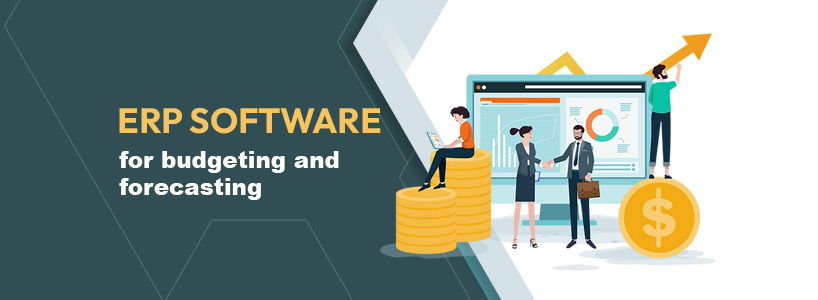ERP (Edu-Automate) Software for Budgeting and Forecasting

What is ERP software?
ERP software acts as a centralized platform that integrates data from various departments like sales, inventory, Human Resources, and finance. This allows for a holistic view of your entire operation, promoting streamlined workflows and improved data accuracy. However, for this blog, we'll delve deeper into the specific benefits of ERP software for budgeting and forecasting.
The Budgeting and Forecasting Powerhouse: Benefits of ERP
Traditional budgeting often relies on disparate spreadsheets and siloed data, leading to errors and inefficiencies. ERP software offers a powerful solution by:
- Centralized Data Repository: All your financial data from sales projections to inventory levels resides in a single, secure location. This eliminates inconsistencies and ensures everyone is working with the same information, leading to more accurate forecasts.
- Automated Tasks: Manual data entry and consolidation become a thing of the past. ERP automates many budgeting tasks, saving time and minimizing errors.
- Scenario Planning: Simulate different financial scenarios based on market fluctuations, product launches, or even potential economic downturns. This allows you to test the impact of various decisions and make data-driven adjustments to your budget.
- Real-Time Insights: Monitor key financial metrics and track budget performance in real-time with interactive dashboards and reports. This enables you to identify areas for improvement and course-correct as needed.
Beyond Budgeting: The Ripple Effect of ERP
The advantages of ERP software extend beyond just budgeting and forecasting. By streamlining financial processes, ERP can:
- Improve Decision-Making: With readily available data and accurate forecasts, businesses can make informed decisions about resource allocation, pricing strategies, and investments.
- Enhance Collaboration: ERP fosters collaboration between departments by providing a central platform for data sharing and communication. This fosters a more cohesive financial planning process.
- Boost Efficiency: Automating tasks and streamlining workflows frees up valuable time and resources, allowing your team to focus on more strategic initiatives.
Conclusion
In conclusion, ERP software is a game-changer for businesses looking to optimize their budgeting and forecasting processes. By centralizing data, automating tasks, and providing real-time insights, ERP empowers businesses to make data-driven decisions, gain a competitive edge, and achieve long-term financial stability. Whether you're a small business or a large enterprise, investing in ERP software can be a strategic move towards financial success.
-
08 December, 2025 at 8:46 amI learned something new from this blog. Your insights are truly valuable!
-
02 November, 2025 at 8:48 pmLoved this post! The way you explained the topic shows great research and understanding.
-
17 October, 2025 at 3:52 pmGreat flow and clarity in your writing style. It makes reading such a pleasure.
-
08 October, 2025 at 4:40 pmGreat flow and clarity in your writing style. It makes reading such a pleasure.
-
06 October, 2025 at 5:48 pmWhat a refreshing take on the topic discussed here! It feels like a breath of fresh air.
-
27 September, 2025 at 7:24 pmVery nice and informative blog. I learned many new things from your post. Thanks for sharing this helpful information.
-
15 September, 2025 at 8:36 amIt agree, it is an excellent idea
-
14 August, 2025 at 11:32 pmYour perspective on this is truly creative and unique. It’s refreshing to see this angle!
-
07 August, 2025 at 7:40 amI learned something new from this blog. Your insights are truly valuable!
-
30 July, 2025 at 7:03 pmWhat a refreshing take on the topic discussed here! It feels like a breath of fresh air.
-
26 July, 2025 at 8:39 pmThis is such a well-written blog post! I love how every idea flows so naturally.
-
24 July, 2025 at 5:40 pmI enjoyed reading this from start to finish!
-
22 July, 2025 at 8:14 pmGreat flow and clarity in your writing style. It makes reading such a pleasure.
-
21 July, 2025 at 9:32 amI can recommend to come on a site where there is a lot of information on a theme interesting you.
-
28 June, 2024 at 12:06 amThis is such a helpful guide! You’ve made the topic easy to understand.
-
28 June, 2024 at 12:06 amYou make complex topics so simple to understand. Thank you for this!
-
28 June, 2024 at 12:06 amThis is exactly what I needed to read today. Thank you!
-
24 June, 2024 at 2:44 amSuch a great read! I learned something new today.
-
14 June, 2024 at 12:17 amAwesome content! I love how clearly you explained everything
Add a Comment
Your email address will not be published. Required fields are marked *
Categories
Popular Posts
![How CRM Vendor Management Enhances Your Procurement Process [thumb]](https://www.weblink.in/static/images/blog-no-image.jpg)
How CRM Vendor Management Enhances Your Procurement Process
![A Principals Guide to Managing Schools Efficiently with EduAutomate ERP [thumb]](https://blogimages.weblink.in/a-principal-s-guide-to-managing-schools-efficiently-with-eduautomate-erp-350x128.jpg)
A Principals Guide to Managing Schools Efficiently with EduAutomate ERP
![Manage Products & Services Seamlessly with CRM Inventory Integration [thumb]](https://blogimages.weblink.in/manage-products-services-seamlessly-with-crm-inventory-integration-350x128.jpg)